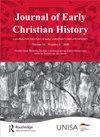Masculinity as Flight: Vulnerability, Devotion, Submission and Sovereignty in the Teachings of Silvanus
IF 0.1
0 RELIGION
引用次数: 0
Abstract
Abstract Late Roman masculinity required dominance and control and favoured violent hierarchies. Yet scholars of early Christian martyr acts and ascetic literature frequently observe ambivalence or deviation from this norm. Rather than accumulate more and more exceptions to the traditional ideal (which was never really singular anyway) or continue collecting variations on this model of masculinity, the following essay seeks to shift the model by introducing a notion of masculinity as a plan of escape from vulnerability, not as a state of affairs or set of traits. Treating masculinity as a trajectory and a necessarily volatile process allows us to accommodate all the ambivalence and variety that has already been observed, because flight is always volatile, because human beings trying to be invulnerable is impossible, and because in the late Roman world, that plan of escape passed through a bottleneck of submission to specific other already-sovereign males. I illustrate the notion of masculinity as flight from vulnerability on the basis of an example of ascetic instruction between master and disciple known as the Teachings of Silvanus, tracing a jumbled narrative arc starting with intolerable vulnerability, passing through indulgence in submission and devotion, to the promise of total sovereignty. I wish to suggest that treating vulnerability as intolerable and fleeing from it is what is at the root of late ancient masculinity.作为逃跑的男子气概:西尔瓦努斯教义中的脆弱、奉献、服从和主权
罗马晚期的男子气概要求支配和控制,并赞成暴力等级制度。然而,研究早期基督教殉道者行为和苦行文学的学者经常观察到对这一规范的矛盾或偏离。与其积累越来越多的传统理想的例外(无论如何,它从来都不是真正的单一的),或者继续收集这种男子气概模式的变化,下面的文章试图通过引入一种将男子气概作为逃避脆弱的计划的概念来改变这种模式,而不是作为一种状态或一组特征。将男性气概视为一种轨迹,一种必然的反复无常的过程,使我们能够适应已经观察到的所有矛盾心理和多样性,因为逃跑总是反复无常的,因为人类试图无懈可击是不可能的,因为在罗马晚期,逃跑的计划通过了一个瓶颈,即屈服于特定的其他已经拥有主权的男性。我以西尔瓦努斯的教诲为例,以大师和弟子之间的苦行教导为基础,阐述了男子气概是逃避脆弱的概念,沿着一条混乱的叙事弧线,从无法忍受的脆弱开始,经过对顺从和奉献的放纵,到对完全主权的承诺。我想说的是,把脆弱视为不可容忍的,并逃避它,是古代晚期男子气概的根源。
本文章由计算机程序翻译,如有差异,请以英文原文为准。
求助全文
约1分钟内获得全文
求助全文

 求助内容:
求助内容: 应助结果提醒方式:
应助结果提醒方式:


